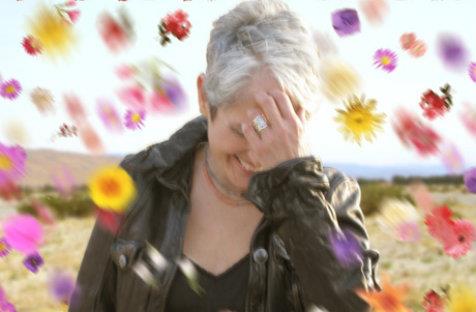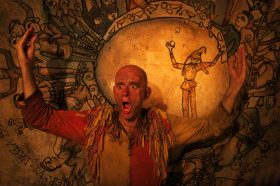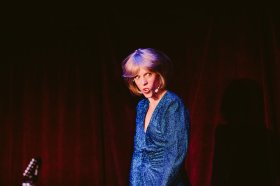The audience was as expected: men and women who may well have been part of the hippie generation of the Sixties and Seventies (and their children and grandchildren), still inspired by the messages of peace and freedom that made Joan Baez the most famous female folk singer of the era.
The signature long black hair has been replaced with a grey crop, and the peasant skirts with a sharp black pants suit and bright green shirt, but the message and the songs remained – and the audience loved every one of them.
True, at 72, Baez does not always exhibit the strength and secure high notes of her younger self, but her passion for social justice lends power to her songs, beginning with ‘There but for Fortune’.
Woody Guthrie’s ‘Deportees’ was introduced with comments on the way both the US and Australia treat refugees – incisively, given that the song laments the victims of the air crash being buried without names. (‘The radio says, “They are just deportees”’). Had Baez perhaps heard of the plea by Christmas Island administrator, Jon Stanhope, to ‘humanise’ those who have died trying to get to Australia by releasing their names, as is not current government policy?
Very likely. Baez showed an acute awareness that she was Down Under, presenting Paul Kelly’s engaging ‘From Little Things Big Things Grow’ (and encouraging the audience to sing with her). One of her encores, Eric Bogle’s ‘And the Band Played Waltzing Matilda’ was all the more powerful when sung by an icon of the peace movement.
Before an ending of four encores, and as many standing ovations, we heard a number of ballads, such as ‘Lily of the West’, with great support from Baez’s own son, Gabe Harris, on percussion, and Dirk Powell playing an extraordinary range of instruments from banjo to violin to piano. Baez herself is no mean guitarist as she showed, for example, in ‘Swing Low Sweet Chariot’.
She also chooses her material well. Written early this century, Steve Earle’s ‘Jerusalem’ remains a strong and despairing commentary on Middle East politics. By contrast, ‘Gracias a la Vida’ had the audience joining in again with the refrain ‘Thanks to the life that has given me so much’. The song is an exuberant tribute to Baez’s Hispanic heritage. She sang it with relish and demonstrated a new and different colour to her voice.
The names (and songs) of Bob Dylan, Johnny Cash and John Lennon were woven into the playlist, with the most evocative of their era being Baez’s own about her relationship with Dylan. It may have brought her ‘diamonds and rust’ – but this performance was pure diamonds.
Lennon’s ‘Imagine’ had Joan Baez’s clear strong voice leading the audience in the words:
‘You may say I’m a dreamer
But I’m not the only one.
I hope someday you’ll join us
And the world will live as one.’
And just for a moment, as it had five decades earlier, the vision all seemed possible.
Rating: 4 ½ stars out of 5
An Evening with Joan Baez
Hamer Hall, Melbourne
8 August
Additional performances:
Hamer Hall, Melbourne: 9 August
Concert Hall, QPAC, Brisbane: 12 & 26 August
Perth Concert Hall: 16 & 17 August
Sydney Opera House: 20 & 21 August
Canberra Royal Theatre: 24 August
The Civic, Auckland: 29 August
Michael Fowler Centre, Wellington: 31 August





